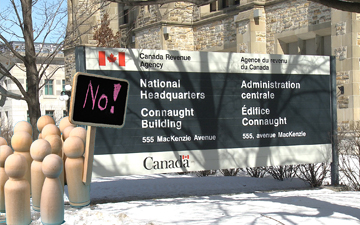How would a CRA strike impact Canadian accountants and tax preparers?

We clear up some of the misconceptions around a strike vote by Union of Taxation Employees at the Canada Revenue Agency during tax season
TORONTO, April 9, 2023 – Canadian tax professionals are concerned that workers at the Canada Revenue Agency will use the looming tax season deadline to leverage strike demands. Members of the Public Service Alliance of Canada (PSAC) voted this past week in favour of strike action. PSAC, together with its subcomponent, the Union of Taxation Employees (UTE), represents 35,000 CRA workers. CRA workers will be in a legal strike position as of April 14.
Canadian Accountant has been tracking the development of a CRA strike for three months and warning tax preparers about potential strike action, as negotiations have been acrimonious between the union and management at the Treasury Board. A final round of negotiations has been set for April 17-20 between PSAC and Canada Revenue Agency.
A strike by CRA workers would be the latest pain point in a long run of trouble at the national tax collector. Tax preparers are voicing their concerns over potential disruptions to service at the CRA. Recent years have been marred by CRA cyberattacks, pandemic support programs, and changing deadlines that have been stressful to many in the accounting profession. Many practitioners are rushing to file tax returns now and are urging tardy clients to hurry with their documentation.
A strike by CRA workers is not inevitable
As reported by Canadian Accountant, CRA employees have been working without a contract for more than a year, and negotiations have dragged on for two years. The talks have been acrimonious, with formal complaints and both sides accusing the other of bargaining in bad faith, but the main issues continue to be salary and remote work.
The issues are thorny rather than simplistic ones. For example, the early salary demands of the CRA workers have been portrayed as “unprecedented,” amounting to 30 per cent over a three-year period, including a one-time bump of nine per cent. But PSAC points to a decoupling of CRA workers from the salaries of the Canada Border Services Agency, with whom CRA workers were paired and paid at the same rate until 2003.
The dispute over remote work is just as thorny. The Treasury Board announced in December 2022, days before mediation, that it was ordering workers back to the office two or three days a week. Since the pandemic, some workers had worked remotely and some in-house.
“We have 9,000 call centre employees, they have a headset and laptop, and they’re sitting at home,” the union head told the Daily Hive. “The CRA doesn’t have the space to have all these people because we grew a lot… We can’t even bring them back to the office.”
The union balked at the ploy, saying working remotely was a bargaining chip, and the Treasury Board had no right to take it off the table. The government, which presumably calls remote work a management right, said workers have until the end of March to complete the transition. A final round of negotiations has been set for April 17-20 between PSAC and the CRA, but some CRA members could go on strike April 14, three days before talks resume with a third-party mediator.
Why a CRA strike may be limited in its impact on tax preparers
While PSAC and UTE represent CRA workers in revenue collection, client services, appeals and some part of audit, another union represents the more complex functions related to tax collection: the Professional Institute of the Public Service of Canada. PIPSC represents 12,000 auditors, forensic accountants, economists, actuaries and finance professionals. Like PSAC, it too has a subcomponent of CRA workers overseen by the Treasury Board, called AFS (the Audit, Financial and Scientific - CRA Group).
While PIPSC members “stand in solidarity with PSAC,” the AFS group chose the arbitration route as its strategy for resolving a bargaining stalemate. The AFS group do not share the same contract as the UTE group — the UTE contract expired a year before the AFS contract. According to PIPSC, its members are required to respect the provisions of their own collective agreements and report to work even if it is being picketed by workers from a sister union.
They do not have to cross a picket line they deem to be unsafe. However, as workers from both unions continue to work remotely, following a shift in post-pandemic work culture, picket lines may also be a feature of past workplace cultures. PIPSC also represents information technology workers in the federal civil service, mostly the nuts and bolts IT professionals responsible for software, hardware, or network systems, but not necessarily the strategic planning or provision of systems.
What this means is that a PSAC strike will undoubtedly slow down and maybe stop customer service at the CRA, it may have no effect on the CRA portal, technology, or the higher-level audit and tax dispute functions of the CRA.
By Canadian Accountant staff.









(0) Comments